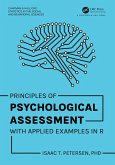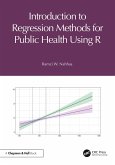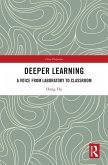170,95 €
170,95 €
inkl. MwSt.
Sofort per Download lieferbar

85 °P sammeln
170,95 €
Als Download kaufen

170,95 €
inkl. MwSt.
Sofort per Download lieferbar

85 °P sammeln
Jetzt verschenken
Alle Infos zum eBook verschenken
170,95 €
inkl. MwSt.
Sofort per Download lieferbar
Alle Infos zum eBook verschenken

85 °P sammeln
- Format: ePub
- Merkliste
- Auf die Merkliste
- Bewerten Bewerten
- Teilen
- Produkt teilen
- Produkterinnerung
- Produkterinnerung

Bitte loggen Sie sich zunächst in Ihr Kundenkonto ein oder registrieren Sie sich bei
bücher.de, um das eBook-Abo tolino select nutzen zu können.
Hier können Sie sich einloggen
Hier können Sie sich einloggen
Sie sind bereits eingeloggt. Klicken Sie auf 2. tolino select Abo, um fortzufahren.

Bitte loggen Sie sich zunächst in Ihr Kundenkonto ein oder registrieren Sie sich bei bücher.de, um das eBook-Abo tolino select nutzen zu können.
Discusses psychometrics, the assessment of various psychological domains, various measurement methods and emerging analytical frameworks to evaluate and improve assessment, generalizability theory, structural equation modeling, item response theory, and signal detection theory, ethics, test bias, and cultural and individual diversity.
- Geräte: eReader
- mit Kopierschutz
- eBook Hilfe
Andere Kunden interessierten sich auch für
![Principles of Psychological Assessment (eBook, PDF) Principles of Psychological Assessment (eBook, PDF)]() Isaac T. PetersenPrinciples of Psychological Assessment (eBook, PDF)170,95 €
Isaac T. PetersenPrinciples of Psychological Assessment (eBook, PDF)170,95 €![Behavior Analysis with Machine Learning Using R (eBook, ePUB) Behavior Analysis with Machine Learning Using R (eBook, ePUB)]() Enrique Garcia CejaBehavior Analysis with Machine Learning Using R (eBook, ePUB)48,95 €
Enrique Garcia CejaBehavior Analysis with Machine Learning Using R (eBook, ePUB)48,95 €![Statistical Rethinking (eBook, ePUB) Statistical Rethinking (eBook, ePUB)]() Richard McelreathStatistical Rethinking (eBook, ePUB)84,95 €
Richard McelreathStatistical Rethinking (eBook, ePUB)84,95 €![Introduction to Regression Methods for Public Health Using R (eBook, ePUB) Introduction to Regression Methods for Public Health Using R (eBook, ePUB)]() Ramzi W. NahhasIntroduction to Regression Methods for Public Health Using R (eBook, ePUB)52,95 €
Ramzi W. NahhasIntroduction to Regression Methods for Public Health Using R (eBook, ePUB)52,95 €![Innovations and Social Media Analytics in a Digital Society (eBook, ePUB) Innovations and Social Media Analytics in a Digital Society (eBook, ePUB)]() Innovations and Social Media Analytics in a Digital Society (eBook, ePUB)49,95 €
Innovations and Social Media Analytics in a Digital Society (eBook, ePUB)49,95 €![Behavior Analysis with Machine Learning Using R (eBook, PDF) Behavior Analysis with Machine Learning Using R (eBook, PDF)]() Enrique Garcia CejaBehavior Analysis with Machine Learning Using R (eBook, PDF)48,95 €
Enrique Garcia CejaBehavior Analysis with Machine Learning Using R (eBook, PDF)48,95 €![Deeper Learning (eBook, ePUB) Deeper Learning (eBook, ePUB)]() Hang HuDeeper Learning (eBook, ePUB)41,95 €
Hang HuDeeper Learning (eBook, ePUB)41,95 €-
-
-
Discusses psychometrics, the assessment of various psychological domains, various measurement methods and emerging analytical frameworks to evaluate and improve assessment, generalizability theory, structural equation modeling, item response theory, and signal detection theory, ethics, test bias, and cultural and individual diversity.
Dieser Download kann aus rechtlichen Gründen nur mit Rechnungsadresse in A, B, BG, CY, CZ, D, DK, EW, E, FIN, F, GR, HR, H, IRL, I, LT, L, LR, M, NL, PL, P, R, S, SLO, SK ausgeliefert werden.
Produktdetails
- Produktdetails
- Verlag: Taylor & Francis eBooks
- Seitenzahl: 640
- Erscheinungstermin: 2. Mai 2024
- Englisch
- ISBN-13: 9781003861171
- Artikelnr.: 70301795
- Verlag: Taylor & Francis eBooks
- Seitenzahl: 640
- Erscheinungstermin: 2. Mai 2024
- Englisch
- ISBN-13: 9781003861171
- Artikelnr.: 70301795
- Herstellerkennzeichnung Die Herstellerinformationen sind derzeit nicht verfügbar.
Dr. Isaac T. Petersen is an Assistant Professor at the University of Iowa. He completed his Bachelor of Arts in Psychology and French at the University of Texas, his Ph.D. in Psychology at Indiana University, and his clinical psychology internship from Western Psychiatric Hospital at the University of Pittsburgh Medical Center.
Dr. Petersen is a licensed clinical psychologist with expertise in developmental psychopathology. His clinical expertise is in training parents how to deal with difficult children. He is interested in how children develop individual differences in adjustment, including behavior problems as well as competencies, so that more effective intervention and prevention approaches can be developed and implemented. He is particularly interested in the development of externalizing behavior problems (e.g., ADHD, conduct problems, and aggression) and underlying self-regulation difficulties. Dr. Petersen's primary interests include how children develop self-regulation as a function of bio-psycho-social processes including brain functioning, genetics, parenting, temperament, language, and sleep, and how self-regulation influences adjustment. A special emphasis of his work examines neural processes underlying the development of self-regulation and externalizing problems, using electroencephalography (EEG) and event-related potentials (ERPs). He uses longitudinal designs, advanced quantitative methods, and multiple levels of analysis, including bio-psycho-social processes, to elucidate mechanisms in the development of externalizing problems. His work considers multiple levels of analysis simultaneously, in interaction, and over lengthy spans of development in ways that identify people's change in behavior problems over time while accounting for the changing manifestation of behavior problems across development (heterotypic continuity).
On the side, he runs FantasyFootballAnalytics.net where he uses statistical methods to help people win their fantasy football leagues. In his free time, he enjoys playing basketball, fishing, grilling, and spending time with friends and family.
Dr. Petersen is a licensed clinical psychologist with expertise in developmental psychopathology. His clinical expertise is in training parents how to deal with difficult children. He is interested in how children develop individual differences in adjustment, including behavior problems as well as competencies, so that more effective intervention and prevention approaches can be developed and implemented. He is particularly interested in the development of externalizing behavior problems (e.g., ADHD, conduct problems, and aggression) and underlying self-regulation difficulties. Dr. Petersen's primary interests include how children develop self-regulation as a function of bio-psycho-social processes including brain functioning, genetics, parenting, temperament, language, and sleep, and how self-regulation influences adjustment. A special emphasis of his work examines neural processes underlying the development of self-regulation and externalizing problems, using electroencephalography (EEG) and event-related potentials (ERPs). He uses longitudinal designs, advanced quantitative methods, and multiple levels of analysis, including bio-psycho-social processes, to elucidate mechanisms in the development of externalizing problems. His work considers multiple levels of analysis simultaneously, in interaction, and over lengthy spans of development in ways that identify people's change in behavior problems over time while accounting for the changing manifestation of behavior problems across development (heterotypic continuity).
On the side, he runs FantasyFootballAnalytics.net where he uses statistical methods to help people win their fantasy football leagues. In his free time, he enjoys playing basketball, fishing, grilling, and spending time with friends and family.
1. Scores and Scales. 2. Constructs. 3. Reliability. 4. Validity. 5. Generalizability Theory. 6. Factor Analysis and Principal Component Analysis. 7. Structural Equation Modeling. 8. Item Response Theory. 9. Prediction. 10. Clinical Judgment Versus Algorithmic Prediction. 11. General Issues in Clinical Assessment. 12. Evidence-Based Assessment. 13. Ethical Issues in Assessment. 14. Intellectual Assessment. 15. Test Bias. 16. The Interview and the DSM. 17. Objective Personality Testing. 18. Projective Personality Testing. 19. Psychophysiological and Ambulatory Assessment. 20. Computers and Adaptive Testing. 21. Behavioral Assessment. 22. Repeated Assessments Across Time. 23. Assessment of Cognition. 24 Cultural and Individual Diversity.
1. Scores and Scales. 2. Constructs. 3. Reliability. 4. Validity. 5. Generalizability Theory. 6. Factor Analysis and Principal Component Analysis. 7. Structural Equation Modeling. 8. Item Response Theory. 9. Prediction. 10. Clinical Judgment Versus Algorithmic Prediction. 11. General Issues in Clinical Assessment. 12. Evidence-Based Assessment. 13. Ethical Issues in Assessment. 14. Intellectual Assessment. 15. Test Bias. 16. The Interview and the DSM. 17. Objective Personality Testing. 18. Projective Personality Testing. 19. Psychophysiological and Ambulatory Assessment. 20. Computers and Adaptive Testing. 21. Behavioral Assessment. 22. Repeated Assessments Across Time. 23. Assessment of Cognition. 24 Cultural and Individual Diversity.







